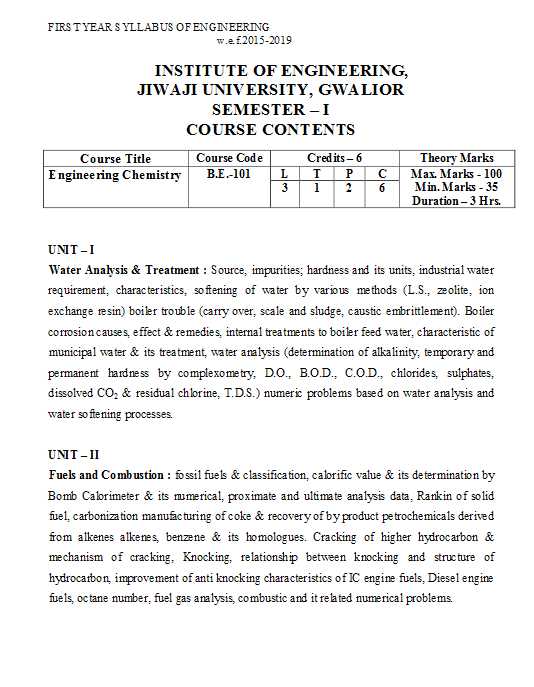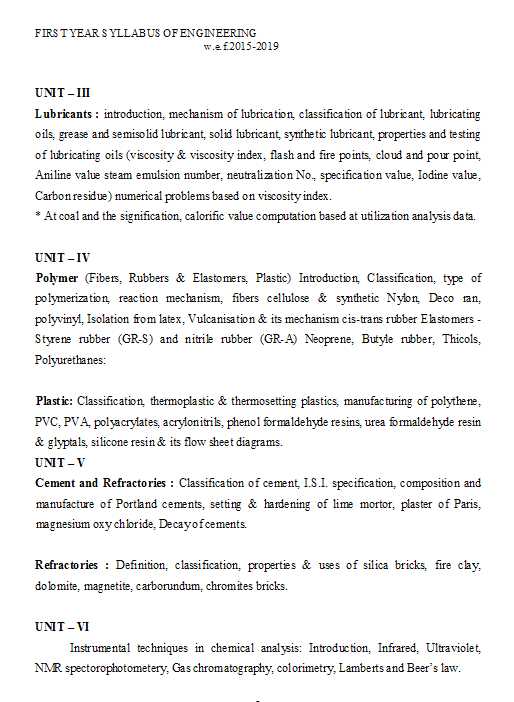|
#3
March 4th, 2017, 02:35 PM
| |||
| |||
| Re: Jiwaji University Chemical Engineering
The Course Contents of BE Program in Engineering Chemistry offered by Institute of Engineering, Jiwaji University, Gwalior are as follows: Semester – I UNIT – I Water Analysis & Treatment: Source, impurities; hardness and its units, industrial water requirement, characteristics, softening of water by various methods (L.S., zeolite, ion exchange resin) boiler trouble (carry over, scale and sludge, caustic embrittlement). Boiler corrosion causes, effect & remedies, internal treatments to boiler feed water, characteristic of municipal water & its treatment, water analysis (determination of alkalinity, temporary and permanent hardness by complexometry, D.O., B.O.D., C.O.D., chlorides, sulphates, dissolved CO2 & residual chlorine, T.D.S.) numeric problems based on water analysis and water softening processes. UNIT – II Fuels and Combustion : fossil fuels & classification, calorific value & its determination by Bomb Calorimeter & its numerical, proximate and ultimate analysis data, Rankin of solid fuel, carbonization manufacturing of coke & recovery of by product petrochemicals derived from alkenes alkenes, benzene & its homologues. Cracking of higher hydrocarbon & mechanism of cracking, Knocking, relationship between knocking and structure of hydrocarbon, improvement of anti knocking characteristics of IC engine fuels, Diesel engine fuels, octane number, fuel gas analysis, combustic and it related numerical problems. UNIT – III Lubricants : introduction, mechanism of lubrication, classification of lubricant, lubricating oils, grease and semisolid lubricant, solid lubricant, synthetic lubricant, properties and testing of lubricating oils (viscosity & viscosity index, flash and fire points, cloud and pour point, Aniline value steam emulsion number, neutralization No., specification value, Iodine value, Carbon residue) numerical problems based on viscosity index. At coal and the signification, calorific value computation based at utilization analysis data. UNIT – IV Polymer (Fibers, Rubbers & Elastomers, Plastic) Introduction, Classification, type of polymerization, reaction mechanism, fibers cellulose & synthetic Nylon, Deco ran, polyvinyl, Isolation from latex, Vulcanisation & its mechanism cis-trans rubber Elastomers - Styrene rubber (GR-S) and nitrile rubber (GR-A) Neoprene, Butyle rubber, Thicols, Polyurethanes: Plastic: Classification, thermoplastic & thermosetting plastics, manufacturing of polythene, PVC, PVA, polyacrylates, acrylonitrils, phenol formaldehyde resins, urea formaldehyde resin & glyptals, silicone resin & its flow sheet diagrams. UNIT – V Cement and Refractories : Classification of cement, I.S.I. specification, composition and manufacture of Portland cements, setting & hardening of lime mortor, plaster of Paris, magnesium oxy chloride, Decay of cements. Refractories : Definition, classification, properties & uses of silica bricks, fire clay, dolomite, magnetite, carborundum, chromites bricks. UNIT – VI Instrumental techniques in chemical analysis: Introduction, Infrared, Ultraviolet, NMR spectorophotometery, Gas chromatography, colorimetry, Lamberts and Beer’s law.   |